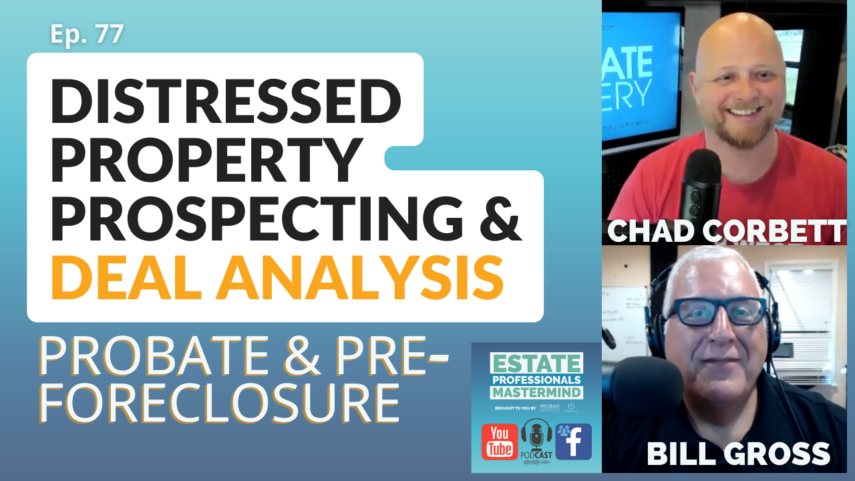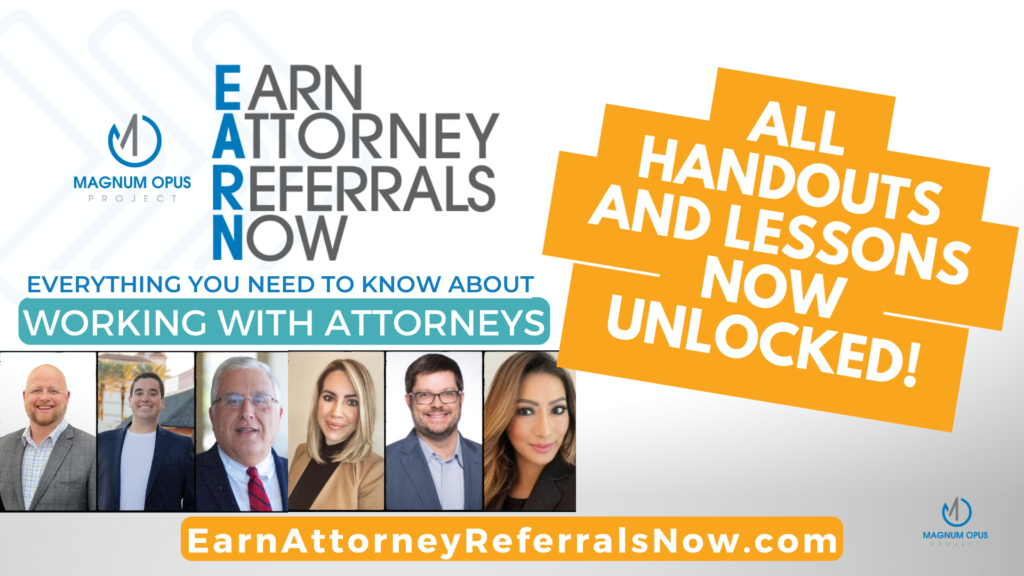In this episode, you’ll learn how to do creative finance and sub2 deals with probate and pre-foreclosure leads. Bill Gross and Chad Corbett coach students on the probate process and foreclosure process, cold calling best practices, deal analysis, creative finance, and transaction engineering. We also have students come back to share their success stories, questions, and insights (Thanks Donna, David, Stephen, Belinda, Rodger, and Richard!).
ANNOUNCEMENTS:
1) EARN has launched! Check out the course curriculum earn attorney referrals now. (Psst…If you haven’t taken Probate Mastery yet, you can save $250 when you bundle both courses!)
Probate Real Estate Certification Course
Episode #77 [Live Real Estate Coaching]
Make sure you’re in our Facebook Group!
Get Certified in Probate Real Estate
Episode Segments for Sub2 deals with probate and pre-foreclosure leads: Distressed property scripts and deal structuring

0:00 EARN Course and Live Attorney Coaching Event (Magnum Opus Project)
Sign up for EARN
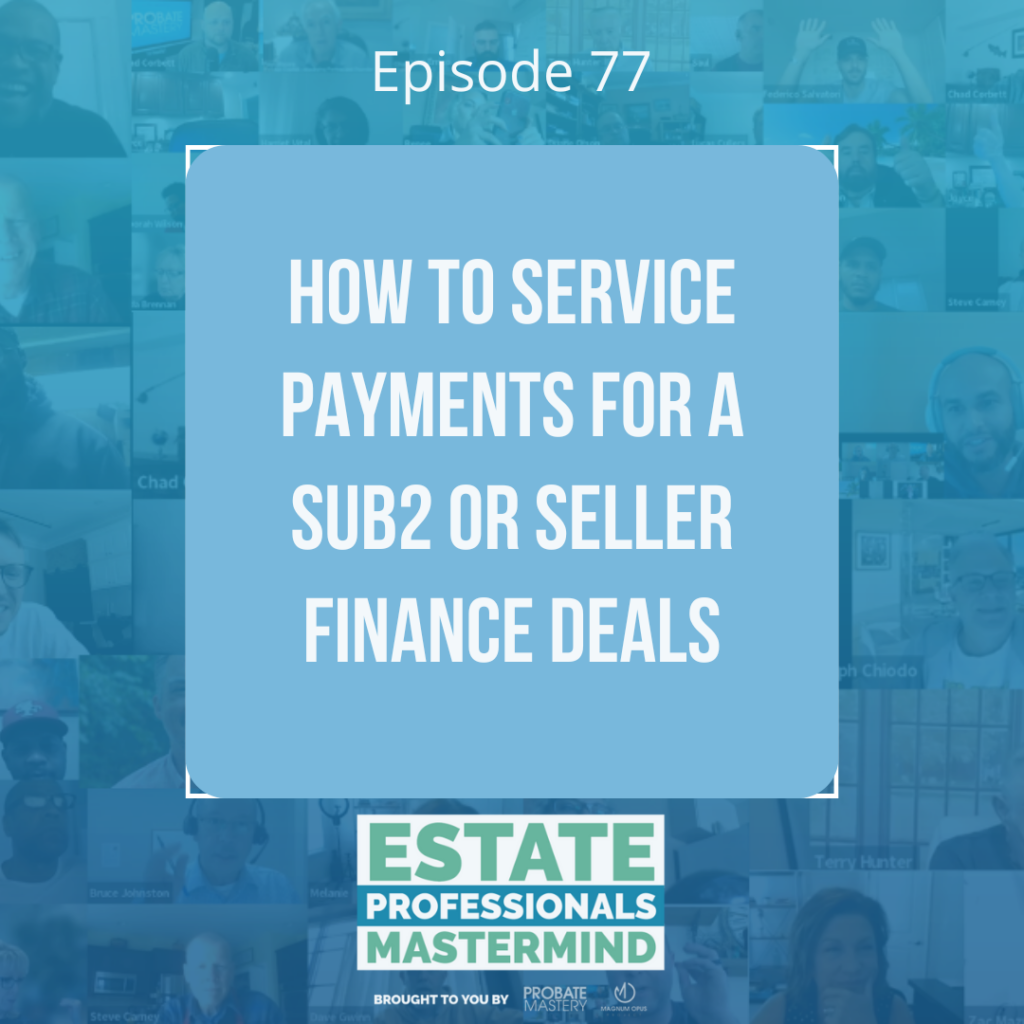
3:30 How to service payments for a subject to deals, or seller finance deals (Real Estate Investing)
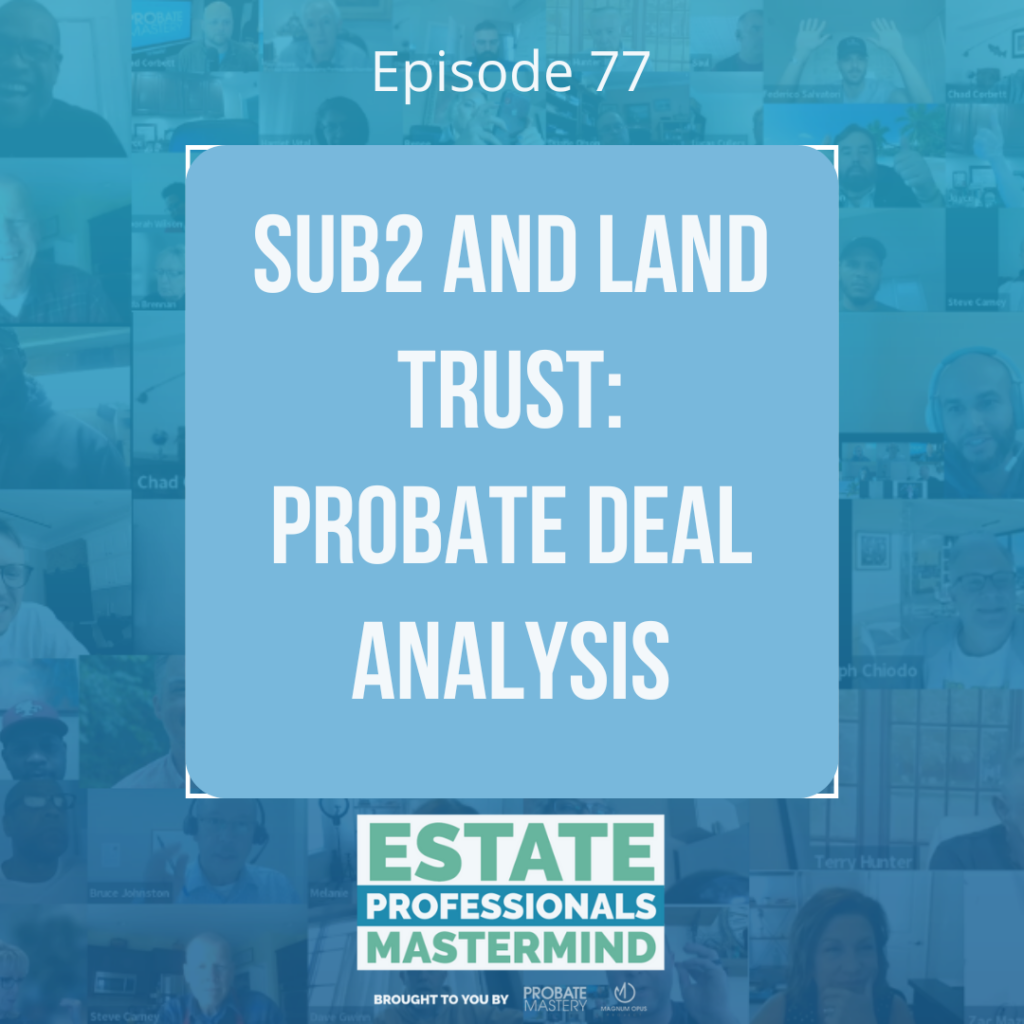
6:28 Sub2 and land trust: Probate deal analysis (Creative Finance Deals)

11:36 Finding a good title company that can close deals fast (Real Estate Vendors)
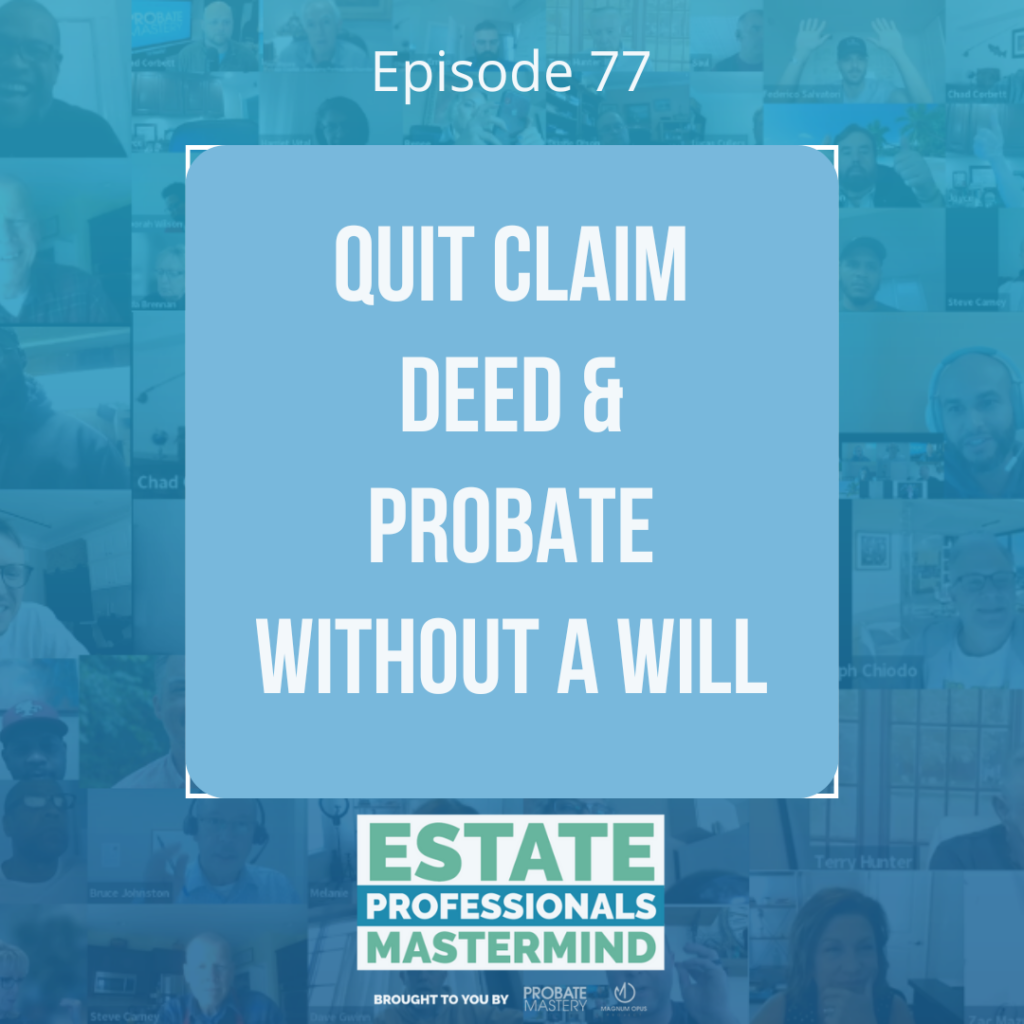
14:04 Selling an inherited home with a quit claim deed: Probate without a will (Probate Situations)
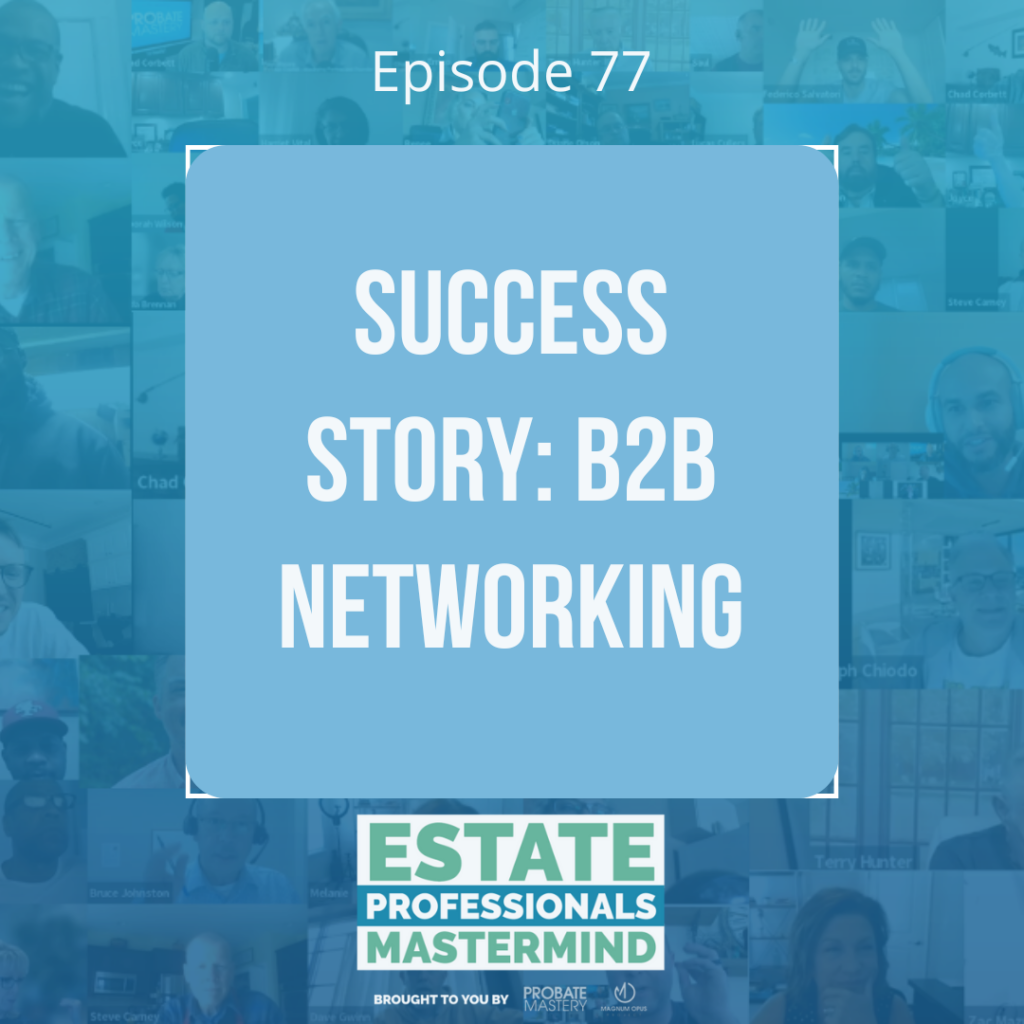
19:45 SUCCESS STORY: Networking with assisted living facilities for ALF referrals (B2B Networking)
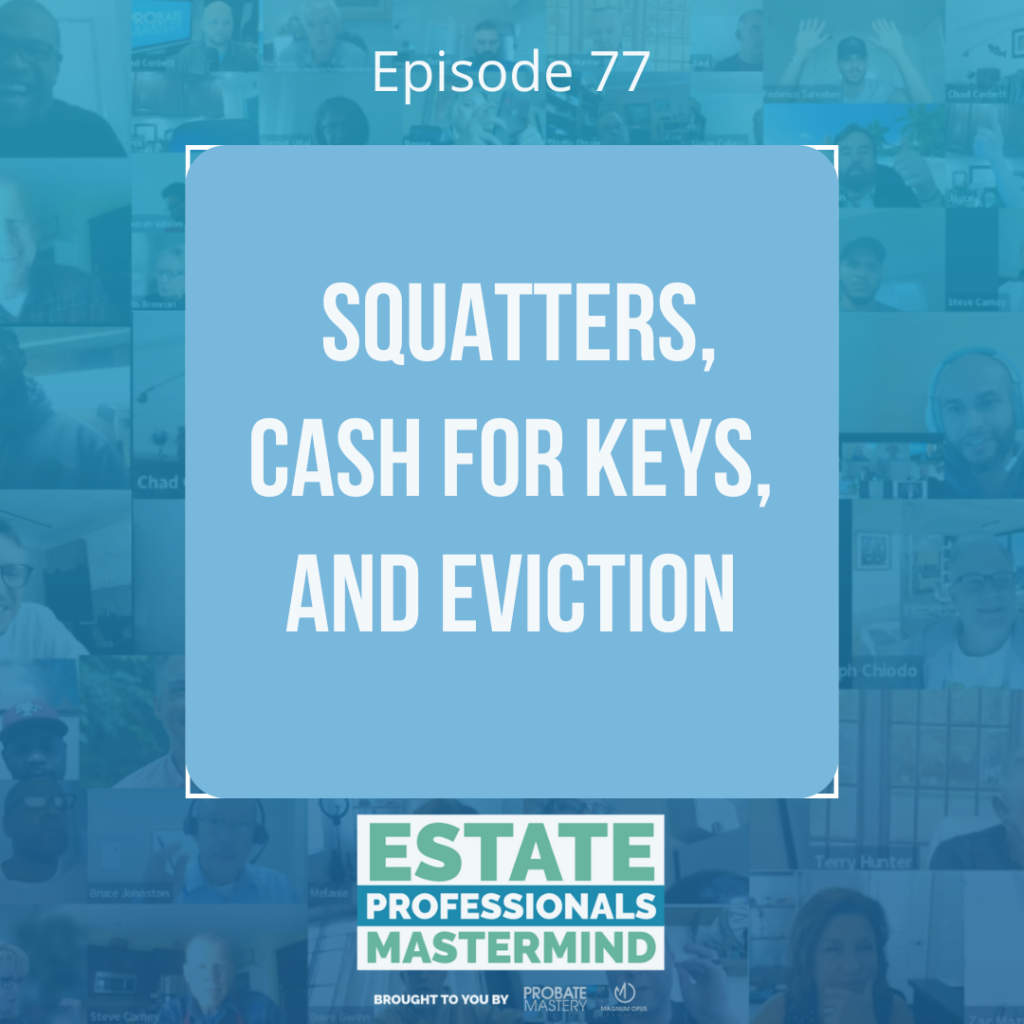
20:48 Real estate investing tips: Squatters, cash for keys, and eviction (Real Estate Investing)
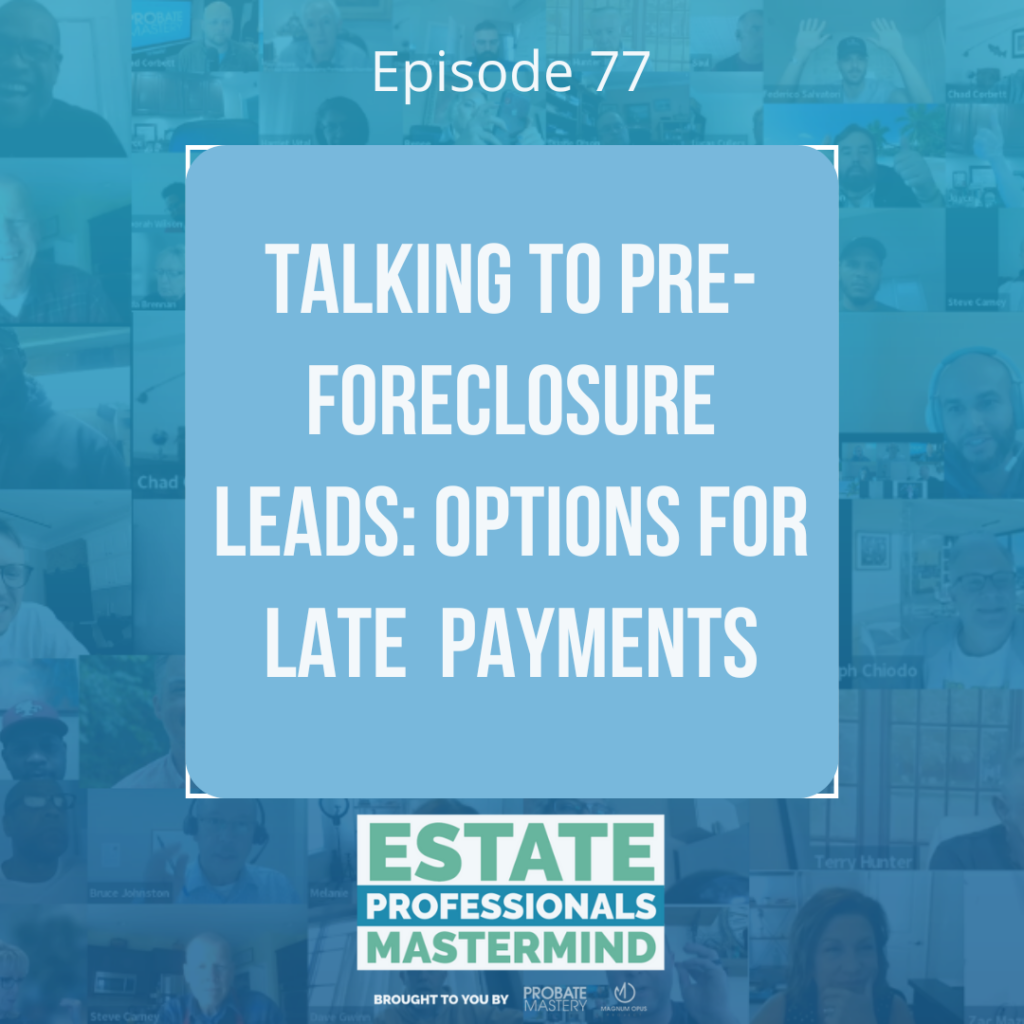
25:39 Cold calling pre-foreclosures: Options for late mortgage payments (Pre-Foreclosure Scripts)
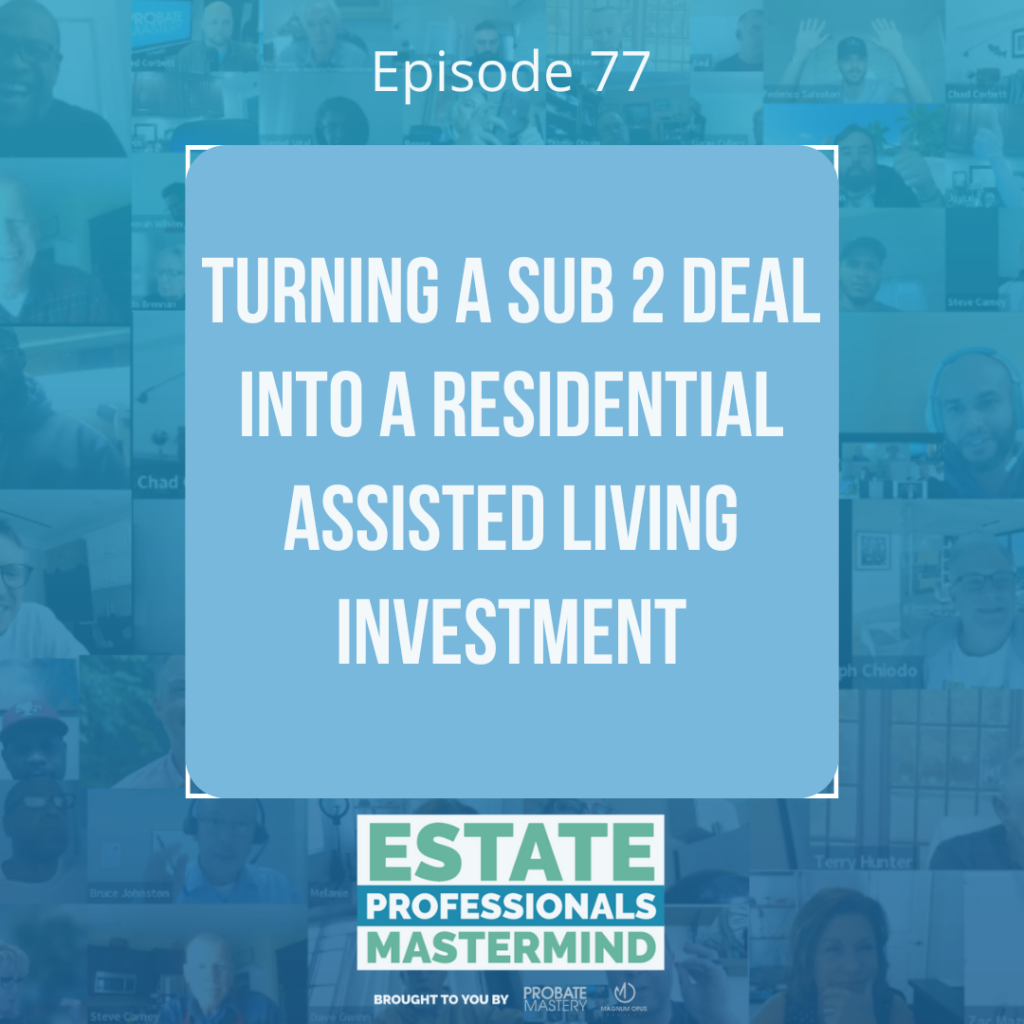
33:15 Turning a sub 2 deal into a Residential Assisted Living investment (Creative FInance)
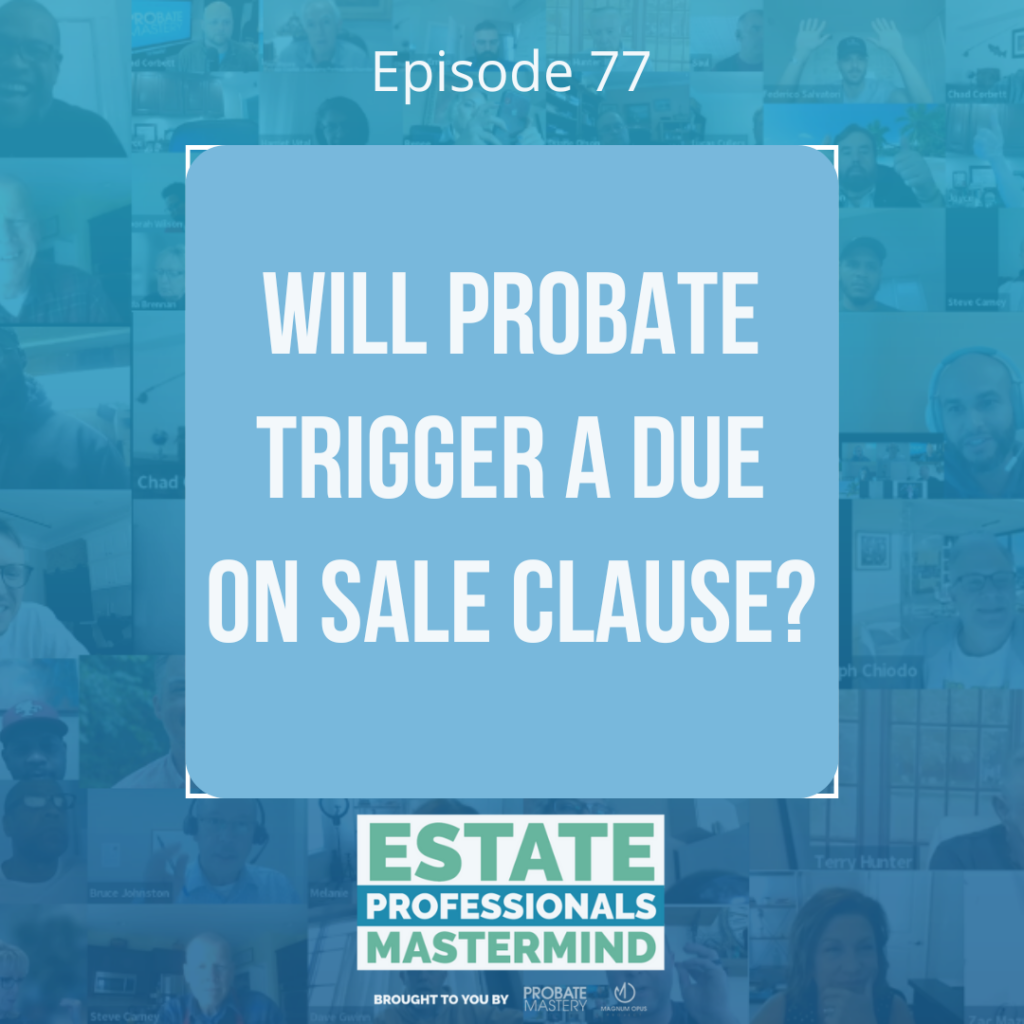
37:14 Will probate trigger a due on sale clause/call a note due? (Creative Finance)

38:29 Step-up in basis, probate tax, and real estate marketing ideas (SOI Marketing)
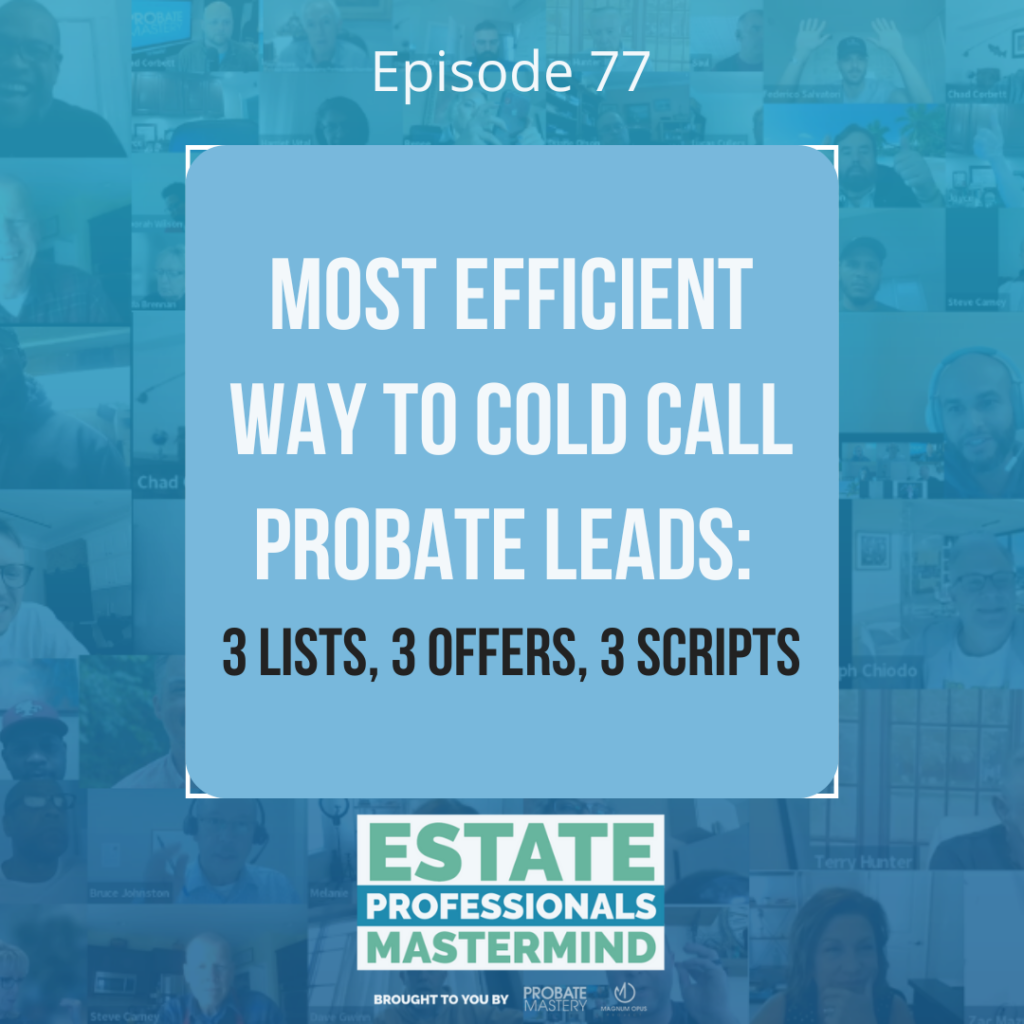
44:06 Most efficient way to cold call probate leads: 3 lists, 3 offers, 3 scripts (Probate Prospecting)
Resources & Additional Links for Sub2 deals with probate and pre-foreclosure leads: Distressed property scripts and deal structuring
RESOURCES:
- FREE TRAINING: Probate Fast Track
- Take Chad’s Probate Mastery Course and get Certified in Probate Real Estate
- Sign up for EARN – Earn Attorney Referrals Now
- Facebook Group: Estate Professionals Mastermind Group
- Probate Mastery Alumni Group (For students of the Probate Mastery Course): Probate Mastery Alumni Group
- Probate and Pre-Probate list providers
- Try Propstream Free
- Book a marketing strategy consultation
- Book a coaching session with Bill Gross
- ISA and voicemail courier service for probate calling
- Try All The Leads automated Probate Leads & Marketing System
- Bill Gross’ Probate Weekly Content: ProbateWeekly.com
RECENT CONTENT:
- Episode 75 Live Real Estate Coaching: Real Estate Cold Call Coaching: PLUS How do probate auctions work? Live Mastermind
- LIVE REPLAY: Driving for Dollars Class: https://youtu.be/DevV8m0Jg4M
- Ask The Expert with Bigger Pockets Henry Washington: Finding real estate deals in 2022 with BiggerPockets Henry Washington (probatemastery.com)
- Success Story: How to become a successful probate real estate agent: Zac Mazur’s story – Probate Mastery
- Probate Cold Calling Tips: Script ideas for new real estate agents/investors in the probate niche: https://youtu.be/MVNY50kPIvo
FOR THIS EPISODE:
- Refresher on probate cash advances: 12 ways to get real estate listings, deals, and referrals with a Probate Cash advance
- Reverse mortgages: What happens when someone dies? Reverse mortgage and probate real estate: Help heirs with Mom’s house (probatemastery.com)
- Pre-Foreclosure training: Prospecting scripts and conversations
- Pre-foreclosure scripts role play and example conversation: https://youtu.be/PwSiutEXshY
- Probate Group Coaching #16: Includes a lot of tips on foreclosure scripts and deal structuring
- Chad’s conversational mindmap: Different Ways To Offer Value to Real Estate Owners:
EPISODE TRANSCRIPT: Sub2 deals with probate and pre-foreclosure leads: Distressed property scripts and deal structuring
Episode 77
1) EARN Course and Live Attorney Coaching Event
Bill Gross: Good afternoon or morning, I guess if you’re in Hawaii. Welcome to Probate Mastery’s weekly Probate Mastery alumni call. I’m your regular host nowadays Bill Gross, the LA probate expert of Southern California. And I host this on behalf of the community and on behalf of our founder in head coach, Chad Corbett who happens of here today.
Hey Chad, how you doing?
Chad Corbett: I’m well, thanks for having me, guys.
Bill Gross: Quick word from our sponsor. What can we do, Chad? How can we help you? What words do you have a wisdom for us or what do you have to help us with today?
Chad Corbett: I mainly wanted to make myself available. I’ve been hiding in the background, finishing the EARN course.
And for anyone who’s not familiar with that yet it’s EARN Attorney Referrals Now. It’s a complimentary course to probate mastery. And as of last night, late everything is uploaded and available. So, for any of you guys who purchased that course pre-launch, you now can take the entire course.
We have a total of nine handouts, and we took those to the point where they’re fully customizable to be used as print or digital collateral for you guys. Bill is one of our guest instructors on the real estate side, as well as Lina Ara who’s a licensed attorney and certified probate expert. And then we have three different attorneys on the attorney panel.
And one of our software partners, one of the surprises that we didn’t even talk about in the pre-launch was we’ve actually included estate management software in the course for you for all of your prospects and clients.
So, we’ve got a total of seven instructors in the course, and everything is done. So, you’ll see more than just me in this course. I think it’s more valuable because of the format, because we have multiple voices from, both sides of the industry.
We’ve had some schedules move around, so the live attorney Q and a call is actually going to be on the 27th, not on the 21st. Schedules changed over the last couple of weeks. So, we just had to move that call.
And because of my personal situation, we were a little bit late getting all the modules out, but everything is complete. I couldn’t be prouder of the course. It actually turned out significantly better than I expected.
So, I wanted to make myself available for any questions, if anybody has any questions about it. I thought I’d be here today.
Bill Gross: Great. And I shared a little bit on there, and Katt put the link in the box for the EARN program. Thanks for doing that.
And then there’s a bundle. If you go to probatemastery.com on the front page, there’s actually a bundle where if you’re not yet in Probate Mastery, you can get the probate mastery and EARN bundle together and save some money as well.
So, take a look at that. If you’re interested in doing both.
Any questions on that program before we start?
Any questions while we have Chad, since he could probably answer better than me on the EARN program, I am an instructor of one of the modules. It was a lot of fun.
We had about 50 people and we recorded talking about. and my topic was how to leverage, going to court to get business. And I think for me, I built my business on that. And people ask me all the time about, you know, how did I do that?
And so, I spent about an hour talking about that in detail. And I really believe business is not about any one idea. It’s about the details behind the idea to implement it that’s critical.
ClaireMonique: That was actually quite interesting, bill.
Bill Gross: Oh, who is that?
ClaireMonique: Claire Monique. That was interesting-
Bill Gross: The module we did on the court perspective?
ClaireMonique: Going to court. Right.
Bill Gross: Thank you. And then was I also charming and handsome during the call?
ClaireMonique: Absolutely. Thank you.
Bill Gross: Thanks. It was fun, but you know, it’s actually what I did and still do. I, there’s a couple occasions.
They had to go to court for my business when I’m listing property, that’s selling at court confirmation or representing an investor. And I always tell agents go, this is your chance to learn. There’s your chance to participate. There’s your chance to meet the attorney. See the judge, get front of the judge.
Hopefully that module will be of benefit to people.
Okay. I’ll see. Anything else on the earn program, hope to see you guys on the program or Probate Mastery.
2) How to service payments for a sub2 or seller finance deal (Real Estate Investing)
Bill Gross: We’ll jump to Donna. Okay. Donna, you are first up, how we help you?
Donna Londot: Haven’t been on here in a while. Sorry, it’s been just swamped! So, I started an investor version of my business, not just a real estate. Realtor. I think that Chad knows a little bit about that, but. So, I have a situation right now.
We opened up our market and we’re doing Arkansas, an area in Arkansas, Pulaski County, and Nevada. And I’ve already done a wholesale deal in Arkansas, but now I have a potential to do a sub2 deal, I think. So, a girl that specializes in it, but she doesn’t specialize in probate, she’s suggesting I do a land trust, but I talked to the title person there and he’s saying land trust is a little problematic there. So, do you have any knowledge about that in Arkansas?
Chad Corbett: Not in Arkansas. I do in quite a bit in Virginia. I actually ended up training attorneys in Virginia on land trusts.
I was a first, second year real estate investor using land trust. And when I would put them through certain title companies, I would end up being the one teaching the attorney how to paper the deal.
So, what I’ve found –
Donna Londot: I knew you were right person to ask!
Chad Corbett: In my experience, it’s just a matter of finding the right real estate attorney who’s used to working with wealthier clients or more savvy investors. I’m assuming your title company has an attorney on retainer.
Donna Londot: Well, I’m still learning this at this company. That’s at pinnacle. But he mentioned to me, the problem with the land trust is that you need an EIN number.
And normally people don’t get one, but couldn’t you just get an EIN number? Cause he says, this problem with paying out is what he is, what he said to me. If I’m saying it correctly.
Chad Corbett: Paying out who?
Donna Londot: When I pay, well, if I’m doing a subject-to, so I’m assuming the mortgage and paying it, it’s something about the money’s going through a land trust versus just a normal trust.
Chad Corbett: Here’s how I structure mine. This might clarify. So, when I buy a house sub2, I’ll have the seller sign, an authorization to release when we sign the purchase agreement.
Donna Londot: Right.
Chad Corbett: I will immediately go talk to the current loan servicer.
And I will get on, like I get signed, set up for online banking where I can actually go in and make mortgage payments manually if I want to.
The next thing I do is I put a third-party servicer in place. I just answered this in our Facebook group.
I use evergreen note servicing out of Washington.
So, if the original, if the lender ever pulls title, they’ll see the 1, 2, 3 Walnut Street land trust.
The payments are coming from 123 Walnut Street land trust through a third-party servicing company. It’s auto drafted. I get a receipt; the original seller gets a receipt, so they know that their credit is protected, and the payments have been made.
Never had a problem with that because the payment is coming from me to a loan servicer.
I don’t recall, and this is something I should know, but I don’t remember if I got my, what do they call the end of your mortgage interest statement? The 1056 or whatever it is?
Donna Londot: Yeah.
Chad Corbett: I don’t remember where those went. But they I think those came to me as the trust, or the beneficiary of the trust.
I got the 1056 form for the IRS.
3) Sub2 and land trust: Probate deal analysis (Creative Finance Deals)
Donna Londot: So, I guess this is situation. This lady is actually she’s… I don’t want to just say stupidly started making payments to her mom’s property, which her daughter was living in, instead of making her own.
And now she’s behind on that because the daughter was behind three months.
The mom passed two years ago, so they had another.
Chad Corbett: Whoa. Okay. I operated off an assumption. Let me back up and be a better coach.
Donna Londot: Okay.
Chad Corbett: This is a probate home?
Donna Londot: It is a probate home.
Chad Corbett: Is the person on title and the person on the loan the decedent?
Donna Londot: Yes.
Chad Corbett: You have a very narrow window, and you basically have, until probate closes to ride your sub2, then you have to refi out of it.
Donna Londot: Oh, okay.
Chad Corbett: So, this is… Sub2 is a really good strategy for reverse mortgages, where you can get a tenant in place quickly, get two months of rent, receipts, and then go do a debt service coverage ratio loan through a community bank.
Donna Londot: Oh, I didn’t know you could do the reverse mortgage. I just closed on a reverse mortgage one, but they were way, they were six months out. So, it was about to foreclose. So yeah, we wouldn’t have been able to do it, but.
Chad Corbett: So, she was making payments on behalf of the estate, and she has since fallen behind on those payments.
Donna Londot: Correct.
Chad Corbett: Okay.
Donna Londot: Now my understanding is she caught up on this house, but she’s now short on her own house because of it. I don’t know why she would do that, but she is. And so, she just paid them like $1,500. She’s told me that they actually put they put the insurance on it for her. So, it’s of course more expensive.
And there’s probably fees in that. Cause I asked her the loan, she only paid $43,000 for it in ’98. And she owes still $43,000 or almost that she said her mom did a refi or something.
She also has a city mortgage. We don’t know if this is going to be forgiven. I talked to the attorney. But they think it is.
Is there’s a, it was, it was for low income. They would allow you to remodel. It’s like 20 some thousand dollars. And my understanding is that after five years forgiven, as long as you lived in the house. Well, she passed in the fourth year. What the attorney believes is that as long as it’s a family member that’s lived in there since, it will still be covered, but we can’t find out for sure until we open escrow, if that loan is still valid or not. We’re trying to find out if that, so that, so I was trying to get help her because she needs desperate help. Her phone’s being turned off, things like that. I thought if I could do a sub2, start making the payments, right, that way? And then give her whatever amount she says she needs to be able to move out of the like move forward.
Chad Corbett: What’s the as is value?
Donna Londot: 60,000, maybe 67,000 max.
Chad Corbett: Why wouldn’t you just go buy it?
Donna Londot: Well, but that’s not in the same condition, 60,000 that’s-
Chad Corbett: no, I said as is what’s the as-is?
Oh, as is,
Donna Londot: I think it’s probably closer to 50, about 55.
Chad Corbett: You would take it on terms, but you wouldn’t buy it cash for 43 knowing it’s worth 55?
Donna Londot: Well, I don’t have, my business partner has that much, but I don’t have, it’s a, it’s not an area… My business partner doesn’t think it’s a good area for us to keep and hold because it’s low income, the school districts are really bad. But I called the property management, and we could get 900 a month for it.
They said all day long. Cause it’s a very big rental area. It’s very neat and tidy area. It’s just that it’s a very low-income area in Little Rock. So, I just don’t know. I’ve been wholesaling so all this time, so I want to start doing more buy and holds or doing some other stuff. And I thought this might be a good opportunity to get it at the 40 some thousand sub2…
And then just give her, say five grand and let her be whole. But I don’t know if you can do that legally in a probate.
Chad Corbett: I don’t like wholesaling sub 2s.
Donna Londot: Well, I wasn’t going to, I wasn’t necessarily going to wholesale a sub too. I’ve been wholesaling is all I’m saying I was trying to build some capital.
Chad Corbett: Why don’t you figure out what the payoff is, make her a cash offer for that, go assign your offer, and she gets out before the foreclosure? Tell her to quit making the mortgage payments. She’s got 90 days, at least.
Donna Londot: Right. She spent thousands of dollars though, Chad, recently. And she’s doesn’t have any income and she need some cash.
So, I need to be able to give her something.
Chad Corbett: Yeah. Go find a reliable buyer and close next week.
Donna Londot: Okay.
Chad Corbett: You don’t need, I don’t think you need court confirmation in that state, right?
Donna Londot: No, as long as she has the PR that’s as long as.
Chad Corbett: Right. So, let’s say it’s 53,000. Include it like, the payoff plus what she, you know, 10 grand in cash.
You get it under contract for 53, go flip it for 55, make a quick three grand and be out of it. And it’s a clean deal.
Donna Londot: Okay.
Chad Corbett: And she can’t get foreclosed on in a week that it takes your investor to close. Like that’s a clean way to wholesale this. It sounds to me like your motivation is as much to help her as it is to make a little money.
Donna Londot: It is. It always is.
Chad Corbett: That’s the cleanest way for everyone,
Donna Londot: okay.
Chad Corbett: Just tell her to stop making mortgage payments. It’s not. And she also, you need to also remind her she needs to invoice the estate for reimbursement.
Donna Londot: She is
Chad Corbett: She’ll get them. Okay. Yeah. She’ll get those mortgage payments back. And it might not be 10 grand.
You might mark it up five grand just to give her some breathing room and still make it a make a spread for yourself and make or make it a better deal for your investor.
4) Finding a good title company that can close deals fast (Real Estate Vendors)
Donna Londot: Okay. Yeah. In Arkansas, they can’t close that quick, by the way. I found that out the hard way this last time, but.
Chad Corbett: Why is that?
Donna Londot: It just, they can’t, they don’t get title work that fast.
I mean, it’s crazy how slow it is. I was a little bit like…
Chad Corbett: I challenge you to find a better title company or find a real estate attorney. Like I’ve closed multi-family deals inside of 48 hours in foreclosure situations. Pulling title is no longer a big deal.
They can do it in hours if they make it a priority.
And like in the EARN course, I talk about one of the ideas you can do with a law firm. I did this with title companies, just show up with lunch and every time you’re in that in town, just go get a nice, like mid to high level catering and just show up and feed their entire office and sit there and talk to them about, just tell war stories. And like it’s few hundred bucks in food, but when you need it, you can pick up the phone and say, this one has to close in the next 72 hours.
Have I called the right place? Or should I give it to your competitor?
Donna Londot: Well, but mortgage companies too Chad are taking a bit to get the payoff on them, with a mortgage. Even in Arizona and which is pretty dog on fast.
Arkansas, I just felt like when I was recommended from the REIA to this title company that was investor savvy, but I certainly can search for someone else, but I just.
Chad Corbett: I would just find yourself a fallback vendor.
If they can’t close a deal in a week, it’s. If they value the business relationship with you as an investor, they should be willing to at least try. that’s one of the things I did. I went around when I first was kind of building my team in Roanoke when I knew nobody.
I met with probably eight or nine different title companies and real estate attorneys. And that’s one of the qualifying questions was ” what is a fast closing and how fast can you close if I have an urgent situation?”
Most of them said three to four days, you know, it’s not reasonable to ask for that very often, but we can do it.
But when I had a seller with her back to the wall, we were able to do it inside of 48 hours. We did a 10-unit apartment building because we had to.
Donna Londot: Okay.
Chad Corbett: In your networking, as you’re building out your network there, ask that question, like if I have an urgent deal, what is the timeline I can rely on you to close in?
Donna Londot: Okay.
Chad Corbett: And that starts a relationship. The relationship starts with an expectation. Don’t pull that string that often don’t put every deal in escrow like that.
Donna Londot: Right. Right.
Chad Corbett: But when you need one, they said that to you, right?
Donna Londot: Okay. Right. Thank you.
Okay.
Bill Gross: Alrighty. Thank you very much, Donna.
5) Selling an inherited home with a quit claim deed: Probate without a will (Probate Situations)
Bill Gross: And next up we have patiently Dave young Dave.
How’s how you doing?
David Young: I’m doing good. Yes. I got a call from a seller, which is the house is going through probate, right. But she got a little situation going on. She says she wanted to sell the house right away. But once I started looking into it, well, let me back up though. The father passed but someone else is living inside the house, which is the girlfriend… which the seller was telling me is the girlfriend.
But the girlfriend is on the house where she signed a quit claim deed. So, her name is on a quit claim deed for the property of the estate. So how can she go around that by selling a house, even though the girlfriend is on the quit claim deed?
Chad Corbett: Who else is on the quit claim deed?
David Young: The girlfriend. I just looked it up on propstream and it said that she was the buyer and seller on the quit claim deed, which she did on January the 27, 2022..
Chad Corbett: That doesn’t. That’s probably a data mistake that doesn’t make any sense.
David Young: Right.
Bill Gross: What city you in, David?
David Young: I’m in Atlanta.
Bill Gross: So, I don’t know Georgia as well, but I know in California, how companies I work with will give you an app where you can pull data and actual copies of documents.
Are you a real estate agent or investor?
David Young: My wife, she’s an agent.
Bill Gross: There you go. Talk to your wife and see if she can’t get access to a title company to copy the document and you’ll look on it.
Another clue would be, is it insured or not? Because anybody can write a document and record it.
That’s not quite true in LA anymore, they’re cracking down on the fraud, but theoretically, you can create a deed, but if it’s not insured by the title company. The title company may or may not accept it and would require extra proof before they allow that to go through.
It’s not uncommon for the ex-girlfriend to create, who thinks she’s entitled because she took care of him before he died, for years. And the other family members didn’t care for him like she did. This is a very common area of litigation where either they fraudulently create a deed, or they create a deed, but it’s not done properly. And that’s why you need a probate attorney who does litigation and specializes in that area to look into something like that.
But I would definitely pull the deed and check and see if it’s insured or not.
David Young: Yeah, but I know she, she said she had, she is on the deed, like for a quit claim deed. I don’t know what you know about the buyer and seller bit, but how can she go about, because she says she want to sell the house. How can she sell the house?
She’s in probate. She is going through probate now. Let me, she sent me a message. Let me tell you what the probate attorney sent to her. They sent her a paper saying the court sent out stamped copies of petition for letters of administration, creditors’ claims, and eight letters with copies of acknowledgement and petition sent to all via certified mail.
Bill Gross: Eight heirs! So that just means to get anything done, you have to get everybody on the same page and get them all to sign the paperwork. And…
Chad Corbett: Well, hold on. I want to make sure I understand this, Bill. So, you’re saying decedent lived in the home with his girlfriend?
David Young: Right.
Chad Corbett: You are talking to a personal representative who was a child?
David Young: Yeah, she’s the child.
Chad Corbett: So, the first thing you have to figure out to know if this is even a sellable asset is: was the quit claim deed legitimately from decedent to girlfriend? And beyond that, was there a will?
David Young: No will.
Chad Corbett: Okay. So, state succession law will dictate where the property goes, but if that was a valid, quit claim deed from him to his girlfriend, then the house is not an asset in the estate. So, it’s a moot point and you cannot sell, they cannot sell the house.
David Young: You saying like the heirs cannot sell the house if she’s [the GF] on the quit claim deed?
Chad Corbett: Not if it was a valid, quit claim from the decedent to his girlfriend prior to death.
David Young: Okay.
Chad Corbett: Because it’s not an estate asset any longer. He cut his family out potentially.
David Young: Yeah. Because he did the quit claim deed.
Chad Corbett: Yeah. if his family was treating his girlfriend poorly, and he wanted to make sure she was taken care of, it could very well be a valid quit claim, which means that is no longer
So, they can’t control the sale at all. They don’t have an equitable interest in the asset.
David Young: Okay.
Chad Corbett: So that’s why you need… Propstream’s an amazing tool, but it sounds to me like you’ve got a data entry error that’s showing the grantor and the grantee as the same, which is not going to be the case. The grantor should have been the decedent.
So, you can either drive to the courthouse or get a title company to pull that. But you need to see the last deed transfer and see the deed, or a simple way is gone visit the girlfriend or give her a call.
David Young: Okay. Gotcha. Appreciate you.
Chad Corbett: Do you know what the relationship dynamic is among the heirs and the girlfriend?
David Young: I don’t think it’s all that good, but I know that this paper said eight letters, but it’s not eight heirs. She’s the only, only heir. It’s just the heir and the girlfriend. So, it’s just two people involved with the estate.
Chad Corbett: Well, the girlfriend might not even be an heir because state succession law will send it the next of kin. If there was no marriage, she might not be an heir. But the will could make her an heir, but the law won’t.
David Young: Yeah, she would not be an heir but…
Chad Corbett: So, here’s what I would do. You’ve got rapport with the personal representative. I would call the PR. I would ask for their permission to call the girlfriend or visit the girlfriend, so they don’t feel like you’re going around them. And then I would carefully enter the conversation with the girlfriend and say, “listen there’s some inconsistencies in this story. I’d like to hear from you. What, what has happened here and what would your ideal outcome be?”
And see, if she might quickly tell you their side, her and her, the decedent side of the story of, ” the kids were assholes and we, then he decided he didn’t want them to have anything.
So, he gave it to me because he knew the end was near.”
You never know, but I would start by asking permission to communicate with the girlfriend, get the story from her. And I would probably go pull title first, so I knew the real story- or I knew the legality of the deed transfer.
David Young: okay.
Chad Corbett: And, uh, yeah, with eight heirs, have fun with that.
Bill Gross: No, he said I was wrong. He had eight copies of a letter. There’s only one heir. Oh, yeah one heir. Just get that’s bad enough. I heard eight copies, I assume that was eight heirs okay, good, Dave, thank you so much.
6) SUCCESS STORY: B2B Networking
Bill Gross: Next up, Steven Hughes has his hand up for a while.
Let’s get. I’m muted and how you doing?
Stephen Hughes: Hey, I’m great. I’ve been doing the probate thing for a month now. Salt Lake City, Utah is where I’m at. Just wanted to share a couple things the past week. I got interested into the probate stuff because mobile homes I do out here and uh, I just got hooked up with this big company that places people in assisted living and had lunch with the guy. He loves me. He’s had probate problems in the past, but also just problems with not having experienced realtor that can also invest.
He loves that we can provide all these different options, like we could do rent to own, or we could property manage, or we could list it as is all this stuff. He loved it so much. This Thursday he’s like, hey, come to the office. I want you to get in the car. You’re going to meet our three attorney partners and also want you to meet our home healthcare company.
We outsource too and ends up. He does a lot of 55 plus mobile homes, which is ties into my other niche. So, it was a really good meeting.
So, I had to thank the course for that.
And, you know, I started off as an agent and kind of got into the investing thing. Having both sides is very advantageous.
7) Real estate investing tips: Squatters, cash for keys, and eviction
Stephen Hughes: But making calls to the leads I’ve been getting.
I had a couple good calls at the end of last week.
One guy, his uncle passed, and he’s got a house up behind the state capital, very lucrative area. But he’s like, the house is in disrepair. There’s a woman that’s been living there, long term guests for about 10 years. Didn’t know where to start. We sent him the state forms but also recommended him to an eviction attorney because most likely he’s going to have to do that if she’s been in there for 10 years, even though they have no proof of a lease or anything.
Chad Corbett: Is anyone in communication with that person?
Stephen Hughes: He’s scared to talk to her, and he has a probate attorney and essentially, she’s like, well he gave the house to me and left me everything.
But there’s no will or anything. She’s just squatting there. She’s like a hoarder sounds like there is some possible meth, that sort of thing.
Chad Corbett: Okay. So probably not a reasonable person.
Stephen Hughes: That’s what it sounds like. And I said, I think you need to go ahead and let’s get you hooked up with this guy, an eviction attorney. I know named Jim Jensen.
Let’s do that. I was like, yeah, you can do the notice to vacate here in the county, but she’s probably just going to ignore it. So, you’re probably going to have to go ahead and get the attorney, especially if she has been there for 10 years like you’re claiming. That’s what Utah calls it a long-term guest.
And it’s just trickier.
You have gone through eviction accord at that point if it’s been that long.
Chad Corbett: Well, don’t forget. There’s still the option that she can leave on her own accord, and it may be cheaper to give her cash than to pay attorney’s fees. So, an eviction’s going to cost you a couple thousand bucks in legal fees.
Go offer that first and say, listen we’ll pay for it. You know, we’ll have a professional moving truck show up here, pack your stuff, move you to a more suitable place. Or we can do this to legal route. Either way, your ass is moving.
Stephen Hughes: Okay.
Chad Corbett: So, cash for keys is, usually my first approach is let’s try to find an amicable agreement and make it financially attractive to them.
And if not, then we can always go to the legal route. Right? But it’s worth a shot. And then that way you can always stand in eviction court and say, your honor, we made a reasonable, we made an offer. We offered up to $2,000 in moving expenses prior to ever initiating the eviction process.
And she rejected our offer. You could even send that certified mail and then follow it up with a phone call the day that you get receipt, that the mail was delivered. And then you’ve got a receipt of certified mail delivery in the courtroom saying here’s where we made her a written offer for up to $2,000 in moving expenses and gave her 48 hours to answer before we filed the eviction.
Oftentimes judges tend to side with the one that looks least favored in, in the situation, which is usually the squatter, right? And it’s just something you can do that it’s the right thing to do, give her an opportunity to do what’s right. But it also gives you a much stronger argument in a courtroom- you’ve destroyed her credibility.
Stephen Hughes: Okay.
Bill Gross: Bill you had something to add in that? Well, I say not also the personal side of it. Oftentimes my client wants me to get the people out of the house, but they want to be humane about it. And I try to point out to them, look it’s true that if we move her out, give her cash her keys, she may blow the money and end up in some drug den somewhere.
But she’s turned this house into a drug den, the house that you grew up in. And by the way, the neighbors all hate you guys for allowing this to happen. And your neighbors grew up with your family and they’re now subjected to these criminals coming in at all kinds of hours. I’m not sure what your particular situation, but I’m not sure, not uncommon the neighbor’s upset because the house hasn’t been kept upright or worse.
And I had a case recently where not only that my client was in a nursing home and not the kind that you pay to get good quality care, but the kind that if you have nothing else, the government provides. And so here, she’s living subsistence in squalor in this nursing home where she had a house that was worth, it was $600,000.
She could have lived a very nice, comfortable life with high quality care and a better quality of life. But the squatter was taking that from her. So, it is a difficult situation, and we want to be humane, but we also want to be humane to everybody, not just the one person who’s not following the rules. And if you’re offering them a reasonable settlement, and sometimes a little more than reasonable, and they don’t take it, they’ve kind of lost opportunity to push back, I think.
Stephen Hughes: I sent an email to title here in the call. I did not think about it, but y’all just talking now. I’m like, oh man, I should totally have my title person pull title and let’s see who all’s on there just to make sure she’s not on it.
And then I can, talk to him.
So, I don’t know if there’s anything else you would suggest with that guy and then I’ll tell you about the other call I had.
Bill Gross: Well, as far as pulling title, I will say that as you start doing more business vendors are much more supportive. And my title rep basically said to me if it’s a case one of my attorneys has, I can pull a preliminary title even if I haven’t listed yet.
And so rather wait till they have letters and can list the property, I can, you know, do it. Help the attorney use it during there you know, whatever they need to do to verify.
They need the legal description to file certain documents and such so good for you for reaching out. And then this goes back to the prior conversation we had, feel free to push here and lean on your vendors for support.
If you’re going to give them loyal business, you want to get business from them. You going to get support from them. I don’t need coffee cups. I don’t need cookies. I don’t need, ballgame tickets. I need them to help me sell houses. Good for you on that. Well, good.
8) Cold calling pre-foreclosures: Options for late mortgage payments
Stephen Hughes: And then I did have another call where it’s a mother and son. And I ended up talking to the other son.
So, the one son died, and the mom had sold her condo. They moved into a new construction home, and they lived in the three months.
He died.
They asked me, is there a way we can pause the payment. I said, you need to call your mortgage lender, tell them you’ve had a life tragedy, that sort of thing. See if they’ll work it out with you. But it sounds like she won’t be able to fund the place so they might have to sell it.
I’m trying to be a little patient in what I told him, I said, see if the mortgage company will give you a couple months because your mom’s grieving. Losing a son is a very difficult thing. Don’t know the cause of death. So, it’s like, let’s give her some breathing room. Let’s try not to force her into a decision.
Let me stay in touch with you. But you’ve got to call the mortgage company and talk to them. I can’t really do anything for you there because they’re the ones that hold the loan. Again. I haven’t done this stuff before, so right. It just because I’m like, oh, I don’t know if there’s anything else I can do to help these guys.
Bill Gross: I think there was a time when you could call banks, mortgage companies and they would actually delay. My experience for the last three, four years has been, they’re going to move according to maximizing and protecting their rights no matter what you do or say. I’ve literally had, you know, called and had them on the phone as nice as can be.
We got a letter from them saying, you have 30 days is there some extenuating circumstances or problems?
And then the 31st day they had filed a foreclosure.
It’s just one of those things where the business I think is such that they’re not going to delay, and you have to plan for them marching towards foreclosure as quickly as they can.
What does that mean? You have to worry about the credit for the decedent. It doesn’t really matter, but if you’re paying late fees and penalties, if they have cash, they want to avoid that. If they don’t have cash, there’s not much they can do. They can advance against their probate inheritance, there are ways to do that.
And we’ve had vendors on this call, and I also help with that as well, have a company that does that, where we’ll advance the money to make the payments if they want. But the only reason to make mortgage payments would be to avoid foreclosure or delay foreclosure.
It would not make sense just to protect the interest, the credit of the decedent, because it’s just not going to make a difference down the road.
So, I would say that’s not to put too much stock into whatever they say to the mortgage company. And I also feel like you want to take control.
When I assign something to the customer, I’m creating them more work. I want to be the solution. And I’d say to, you can call the large company. My experience it is going in one ear, out the other. They’ll be nice on the phone, but they’re going to continue to foreclose.
And we have to prepare for that. And here’s our timeline.
And, and they can’t foreclose before this time, and we need to get it sold before that. And as long as you get that done, then you’re okay.
Stephen Hughes: Okay. It makes sense.
Bill Gross: Katt put in the chat box prior episode, with Probate Cash, one of the vendors that you can use that can help you with that as well.
Chad Corbett: Steven. So, what I gathered from that is you’ve got the son as a decedent. The mother is the admin, the executrix or administrator of his estate.
Stephen Hughes: No, the other son is.
Chad Corbett: Okay. So, the brother is the administrator.
Stephen Hughes: Yeah. And the brother is the PR, and the mother’s just in the house.
Chad Corbett: The mom’s living there. Okay. Yeah. Yeah. And brother has been making mortgage payments, but can’t any longer?
Stephen Hughes: Well, he doesn’t want to. The deceased was making the payments. They sold mom’s condo to put down a huge down payment on this new construction house.
And that’s like $700,000. And she sold her condo for like 300.
Chad Corbett: Okay. And she, so that’s her primary residence now and she needs to stay that way.
Stephen Hughes: Exactly.
Chad Corbett: She can’t afford to make the mortgage payments.
Stephen Hughes: Bingo.
Chad Corbett: And he didn’t have life insurance, the decedent.
Stephen Hughes: It doesn’t sound like he did. It was unexpected.
I’m not quite sure how he passed, but he just died.
Chad Corbett: Is there equity in the home?
Stephen Hughes: Probably some, but the market has shifted so much. I mean we’ve seen new construction houses lose a hundred grand in value in the past three months out here. So…
Chad Corbett: How many bedrooms?
Stephen Hughes: It was four bedroom, two and a half bath.
Chad Corbett: I would tell her to find a place to live that’s smaller if it’s just her by herself and rent it. If you can’t sell it, rent it.
Stephen Hughes: Okay.
Chad Corbett: That’s what I would do. It’s so I don’t know if you’ve heard, we actually have an example of it on the YouTube channel.
The way I interview people in a pre-foreclosure situation, I know nine, 9.9 times out of 10. I know that they’re not going to be able to stay in the home, but nobody wants to be told that. Right. So, you start the interview with, listen, let’s, I’m going to ask you a series of progressively more personal questions.
If any time you’re uncomfortable, please let me know and explain to me why you’re uncomfortable. But in order for me to really look at all the options available to help you, I’m going to have to have some of the, I have to have you answer some of these questions. So, we’ll start to interview her and say, do you currently have an income that can support this mortgage?
No. Do you expect a windfall of cash? Do you expect passive income from somewhere? Is there money in the estate you’re expecting to inherit?
I’m just walking her through an interview. I know the answer. I know she can’t afford the house and I know she needs to move, but she doesn’t yet.
So, in a matter of 30 to 40 minutes, I can walk somebody to a conclusion that would take 90 days and end with a sheriff, and I can save her that embarrassment and give her a more suitable living situation with dignity and tact.
And I can help her in one conversation come to that realization.
So that’s what I would recommend is sit down with her, walk her through the options until you hit a dead end on every one of them.
And then the options basically become, we try to sell the home at market value, which is unlikely because the markets fallen a hundred grand and rates have risen. So, your options really are you rent the house, or you sell it to me subject to…. well, it’s in, it’s going to be tied up in probate, so that probably doesn’t make sense.
Either you rent the house, or you have… Was this one, was there a will or is it intestate??
Stephen Hughes: It’s he it’s in probate, but he did. I think it’s like informal probate is what they call it here. Like he filed himself and doesn’t have an attorney.
Chad Corbett: But was there a will?
Stephen Hughes: I didn’t ask him, so I don’t know.
Chad Corbett: Okay. We’ll assume there wasn’t which state law will say the brother gets some, the mom gets some, right. So, they’re 50, 50 heirs to the estate. If the estate could quit claim the asset, the brother and mom, and then brother and mom actually sell it to you.
Well, you can’t because you got the note. You’d have to come in with cash. Like I, this one I would tell them to rent it.
Stephen Hughes: Yeah.
Chad Corbett: Or tell her to save every dime she can and get ready because in three to six months, she’s likely to have a knock at the door.
Stephen Hughes: Yeah.
Chad Corbett: This is going to become more and more common guys. Recency bias as blinded as to what it was like in 2012, 13, 14, we’re going to uncover more and more of these situations where you have nice homes with debt on them.
And people bought the payment, not the price and the price has changed 30, 40%. The payment for that same house is twice as high. So, this is where creative financing can backstop your markets. But in probate, it becomes challenging because you have to find the way to transfer title.
So, the estate could transfer title, subject to the existing lien staying in place. Then you could do a second sub2 deal. But getting the heirs to understand that is probably it’s going to be difficult, but you could do a two like a two-title transfer sub2 here. If you can get everybody on the same page. It’s going to require you to really be able to dumb it down in layman’s terms.
Because you have to get title to transfer out to them as heirs with the lien in place because you can’t pay it off.
Then you have to pay a second set of transfer taxes and get it to transfer from them to you. And then you’re eventually, holding the asset, the note’s still in the decedents name, and then you have to find a way to refinance it.
And if you, and on that one, if your equity’s super thin like that, if you’ve got a hundred thousand dollars spread on equity, you’re better off to have them quit claiming out to themselves and turning them to an investment property, or quit claim out to the mother and have her get roommates or just let it go.
Stephen Hughes: Okay.
9) Residential assisted living investor joint venture
Chad Corbett: What’s her age?
Stephen Hughes: The mother he says she was in her mid-sixties, and I’m guessing he’s around my age, like early thirties, mid-thirties.
Chad Corbett: Yeah. One thing to consider are, there’s things like pad split, there’s residential assisted living, RAL homes. They could convert it to a business, it could be, hell you could, it could be as simple as Airbnb.
She could just Airbnb rooms to make the mortgage payments.
But eventually the probate has to close, and the bank needs paid off. So how are they going to do that?
Stephen Hughes: Yeah.
Chad Corbett: While the probate is open, you can control the situation by getting the debt service covered.
But eventually they’re going to have to come to a conclusion that if they can’t sell the home for the note payoff and it’s probably going to have to be let go. Okay. And probate can stay, there’s no mandate on how long probate or how long it can be. You can drag it on for two years if you want.
And, be using the rent to make the mortgage payments over that two-year period. Maybe the equity catches up. Maybe they can get refinanced, but if she’s 65 and doesn’t have any cash, it’s unlikely she’s going to be in a position to refinance it ever.
Stephen Hughes: Yeah.
Chad Corbett: Stephen, I have one other thing. Like, do you know if there’s an HOA?
Stephen Hughes: I don’t believe there’s an HOA, but I could double check it on MLS.
Chad Corbett: Check your zoning and check your HOA regs. If there are any, there might be the potential that you can bring in an existing RAL provider. You’re near Salt Lake you said, or in Salt Lake?
Stephen Hughes: Around the area I’m north of it, but I work in the county care.
Yeah.
Chad Corbett: So, someone to add to your network, find a residential assisted living investor. Sit down with them. Say, can I buy you a cup of coffee? I thought I might have a deal for you. Sit down with them. The potential here is that the family could potentially base essentially, they could accept it as inheritance.
I’m just trying to think, like you could do that two-layer sub2 and it might make sense for him because he’s going to get three- or four-times market…. well, three- or 10-times market rent. One of the things you could potentially do is he could JV with the heirs so they could quit claim the home, sub2 into a land trust.
And he’s 50% beneficiary- the mom and son are 50% beneficiary. Now they’re essentially going to become business partners and they need to get the hell out of his way. She’s going to move either way, but this could be a way that you could preserve and grow generational wealth without them having to let go of the house, and he could get a free house for his RAL model, brand new free house.
I was just trying to think outside of the box, you might find somebody who has a residential assisted living portfolio and at least sit down with them. Cause it sounds like that might be a really good, a good use for the home. You’re in a major Metro market where there’s a shortage of assisted living.
Stephen Hughes: Yes.
Chad Corbett: So that’s why I’m going that route. That’s why I think it might be the highest and best use.
Stephen Hughes: Well, that, that makes a lot of sense. I do have a meeting with a company called it’s a self-property management. They own 12 big, assisted livings. And I’m going to have a meeting with basically their board about being the real estate agent that they recommend to their sales reps, just because they need people to sell their house, to move into their communities.
And that’s a very big thing. So that’s something I okay. Yeah. I can talk to James about that. That’s a great idea.
Chad Corbett: Yeah, that way you’d only have to move the deed once. The debt could stay in place. It rolls into the land trust. It looks like an estate plan. Now the bank is going to get… the bank is going to get notice from social security that a death occurred, and they could call that note at any time.
That’s something you need to be aware of anytime you do sub However, if we are putting residential assisted living, if that’s the model we apply to the house, the reason I chose that is I’m damn confident we can have a debt service coverage ratio higher than 1.3. Even if rates go to 12%, because we can take a four-bedroom house and rent it for 4,000 a month where the market rent would’ve been 2000 a month.
I know I’ve got the DSCR I need for a cash out refi contingency.
Stephen Hughes: Okay. Okay.
10) Will probate trigger a due on sale clause/call a note due? (Creative Finance)
Bill Gross: Thanks so much.
Roger Baldwin, your next up.
Rodger Baldwin: Just a quick question for Chad. On the subject to, I’m familiar with subject to, and I’m familiar with the option that the bank might call it due, but typically as long as they’re getting their money, they’re happy with it.
Now, is it the actual probate process that requires you to refinance if you have a subject to?
Chad Corbett: It’s the probate process that will alert the lender that the decedent, the mortgagee is deceased.
Rodger Baldwin: Right.
Chad Corbett: If they’re still getting paid, there’s a good chance they’re not going to call a performing note, but I always in, in these probate sub 2s you I’ll say you must have a contingency plan. So, if I’m going to do a deal sub2, I like to have a secondary finance plan in place.
Basically, all you have to look at is will the market rent support, the payment at 130, 130% of the payment at the future interest rate.
And if the answer’s yes, in a community bank will they’ll refi you out of it.
Rodger Baldwin: Gotcha. Okay. Just wanted, know if there’s any legal aspect of it outside of the normal subject to parameters. That’s all.
Chad Corbett: It’s all above board and doable. There is just always that chance that the lender could trigger the due on sale plus.
Rodger Baldwin: Very good. Thank you. All right. Thanks so much.
11) Step-up in basis, probate tax, and marketing opportunities (SOI Marketing)
Bill Gross: I think this will be our last question. Waiting patiently. Richard actually came on last week. We had a question about the effect of tax step up and does the estate miss it if they don’t take advantage of it during the probate process.
And as I said, about eight different ways, I’m not an attorney and can’t give legal advice or tax advice, but he actually researched the answer, and he got some good advice for us on that topic.
Hey Richard, how you doing?
Richard Galway: I’m great, Bill. Thanks. Thanks. Yeah, I, I listened to last week’s call after it was posted. And the question came up, does a step up in basis, is that triggered by the death of the decedent or the close of the probate case.
And no one seemed to have an answer on that call. So, I did some quick research and the citation on that, even though I’m not an attorney, I’ll give it to you. This title 26 of the us code section 1014. So, this is internal revenue code. And as I was thinking about it logically the tax code is entirely separate from whichever state, you’re operating in the state probate code.
Bill Gross: Correct.
Richard Galway: So, in a tax question, it’s the internal revenue code that’s going to control. And that section 1014, a one says, except as otherwise provided, the basis of property in the hands of a person acquiring that property from a decedent is the fair market value of the property at the date of the decedent’s death, it gets into a bunch of other special circumstances, but B one goes even further and says that step up in basis applies to property acquired by bequest, devise, inheritance, or by the decedent’s estate, from the decedent.
Bill Gross: Right?
Richard Galway: So, the estate automatically gets the step up and basis on the date of the decedent’s death.
It has nothing to do with, is there a probate case filed? Is it an open probate? Is it a closed probate? That’s strictly that.
And the other point is there are lots of situations where the probate law and probate court in your state wouldn’t have any effect and wouldn’t even be involved in case of a transfer per the terms of a living trust if the property was titled in the name of that trust. A transfer on death deed, if your state has those… whole bunch of other situations that I referenced in my email to you in a conversation back and forth about that.
Bill Gross: This was an answer to question: if I was considering, should they sell the property during probate or should we, till after probate and the answer was, it doesn’t really affect them as far as step-up basis to avoid the taxes on the estate. And thank you for answering that.
And then also the email you sent points out there’s some exceptions where people try to deed on a family member to be able to control the estate before mom dies. And that can totally change the step-up basis. Because now once you have the child on. That portion of the property doesn’t go up in value.
Doesn’t get to step up perhaps.
Richard Galway: Right.
Bill Gross: So definitely these are things that we want to consult with attorneys. What I said, and I did. And I, for those in the call, I want to tell you, I, I took my own medicine is I took the opportunity to call two different CPAs to ask them this question. More important than the right answer is the phone call the accountants to remind them our probate expert, if anybody needs help to contact me.
And they were flattered that I called them. And they respect that you had enough information to even ask a good question. So, I would say all of you, if you want to get one more good contact in your probate business, call your local accountant and ask that person how they would handle that. Even though you have an answer from Richard you can refer a client who asks you to the accountant.
You, you may or may not want to refer them to Richard, but you might want to refer them to your accountant. Richard, thank you for the research. I appreciate it.
Richard Galway: Yeah. It’s often wise to play dumb and ask an expert to start a conversation.
Bill Gross: Exactly because we want, we want to be in relationship with those experts.
Richard Galway: We don’t want to, and you can ask them about the situation where someone is. Usually someone who’s not very sophisticated financially is thinking that even though they might only own a house, that’s the only sizeable asset they’ve got. They think they’re going to owe a boatload in estate taxes or they’re worried, or they’ve got three kids.
The two older kids are married, have houses of their own are doing okay financially. And junior is kind of the black sheep falling behind his siblings. And they say, well, I’m going to give junior the house so that he has a house too, but I want to keep the property taxes the same for him, because he doesn’t have much income.
So, I’m going to put him on the deed. So now, right. I’ve quit claimed half the house to him. That’s a gift and there are gift tax implications that have to be dealt with. But beyond that, the basis follows the gift at the time of the gift. You don’t get to step up in basis. Junior won’t get that on his half of the house.
He might, when mom or pop dies on the other half.
Bill Gross: Look, this is all great material. And I always tell people, if you want to build your probate business, pick an area or niche that excites you and interests, you learn about it and then share what you learn with your clients, with your database.
You don’t need to just call new prospective families in probate. But if you already have a database of two, 300 past clients, friends, family, when you learn these things, share them within. True of 300, very few will need to sell a house in probate. But if one or two did a month. You’d have a great business.
And so that’s where we want to be learning and become experts, be in the process of being an expert, not the destination of having been an expert. Richard, thank you very much for following up on that. I really appreciate your follow up in the email and such. And then it’s, it is kind of time to wrap up here, Chad and again, it is your call.
So, any last words or anything that you want to show us before we wrap.
Chad Corbett: Well, I have a hard stop in two minutes, but I did see Katt had somebody who’s at work during this call had left a question.
12) Most efficient way to cold call probate leads: 3 lists, 3 offers, 3 scripts (Probate Prospecting)
Chad Corbett: So, Ian had asked about using VAs and dialers, and he’s basically asking about call priority.
So, what I would say, Ian is you can use the David Pannell methodology of splitting your list. Like if you’re trying to make the most out of your time.
So, if you have a list of probate leads, separate them with the ones with the spouse’s last name and decedent last name go into one group.
And that’s very likely your surviving spouses.
The in-town personal representative. So, if the personal rep address has the same address as the decedent, that’s likely in town.
And then the absentee. So, where the decedents address is in a different state, or the personal rep address is in a different state than a decedent.
The way David has set up his call structures, he’ll call the out-of-state personal representatives first in a group.
Then, he’ll come down to the in-town personal representatives.
Then he’ll go to the surviving spouses.
That’s just based on his personal experience of how easy it is to close each category.
But if you’re really trying to focus your effort and make the most out of the limited time… let’s, just say there’s 10 out of state, well you’re making the same pitch all 10 times.
And then, when you switch to the in town, the conversation may change a little.
So, on Tuesdays you call the out-of-town people. On Wednesday, you’ve got time, you’re going to call the in-town people.
On Thursday, you’re going to call surviving spouses. That’s just one way, I think that should answer your question. You can load those into the dialers as segments and dial per segment.
If you’re using a VA to do that, then you can have three different scripts potentially for the offer that you offer each. For example, out of town, the out-of-town group, you may offer to go over post a no trespassing sign, bring a contractor and change out the locks. Could be a strong offer.
And one of the incentives and one of the marketing funnels we’ve built into the EARN course is actually a customizable, personalized, no trespassing sign. So, you’ll send the personal representative, a letter, offering to design print, and post a no trespassing sign.
They call you because they have to tell you what name to put on it to make it legal, and that gives you an opportunity to get an inbound phone call. But you could on that script on your out-of-town sellers, you could lead with a no trespassing sign.
Where in town sellers, you might lead with a different hook.
So anyways, hopefully that answers your question, Ian.
And other than that, I am going to wrap up and go play with some artificial intelligence. I’ve got a friend that’s demoing some tech. So, we’re going to see if we can turn Bill Gross into a robot. You guys see if we can build a Bill Gross AI!
Bill Gross: I don’t think my wife wants a second one to me.
I don’t think that would really work very well, but anyhow.
So again, this is Probate Mastery we do this every Tuesday at noon Pacific, 3:00 PM eastern. ProbateMastery.com is the website you can go there and see past episodes, clips, all the resources that we mention and then probate mastery has a Facebook group as well in the details.
So, thanks so much for being on the call, guys. I’m Bill Gross and make it a great week. We’ll talk soon.
Learn more about probate real estate certification and how to find probate real estate opportunities through Probate Mastery
